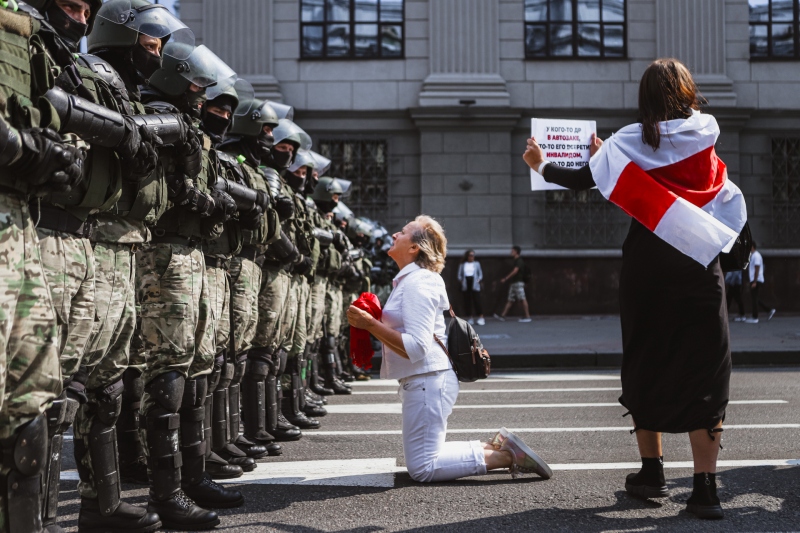European Parliament’s prize awarded to the Belarusian opposition | WATCH DOCS
Jump to contentEuropean Parliament’s prize awarded to the Belarusian opposition
Rigged elections and public response
In August 2020, the democratic opposition of Belarus began an unprecedented process to mobilise society in peaceful mass protests for democracy in a country long considered the last dictatorship in Europe. The protests began in the light of elections that saw Aliaksandr Lukashenka claim his sixth term as president in a contest marred by allegations of widespread electoral fraud. The united opposition insisted that the leading opposition candidate, Sviatlana Tsikhanouskaya, had won a decisive first-round victory with at least 60% of the vote. They called on Lukashenka to start negotiations to transfer power and created the Coordination Council to that end.
Almost immediately after the announcement of the falsified election results by the Belarusian authorities, the streets of Minsk and other Belarusian cities began to witness mass protests of people calling on the Lukashenka regime to give the true result of the election. In the weeks that followed, the streets of Minsk were filled with record-breaking demonstrations attracting over 200 000 people. There were protests all over the country: both in large cities and in the countryside. The regime responded with an unprecedented level of violence and repression. Thousands of police and army officers were sent to suppress the protests. The streets of the Belarusian cities were covered with blood. The demonstrators - brutally beaten, placed into custody and tortured. Kidnappings and disappearances of opposition activists, abducted by the so-called "unknown perpetrators", are a daily occurrence. There is a lack of information about the number of victims of the war that the Belarusian dictator has declared to his own people. It is known that until the beginning of December more than 30 000 people have been detained for participating in the demonstrations.
Opposition activists
Brave women such as Sviatlana Tsikhanouskaya, Svetlana Alexievich, Maryia Kalesnikava and Volha Kavalkova, members of the Coordination Council presidium, along with the political activist Veranika Tsapkala, have become symbols of the opposition and offered hope to Belarusians. They have been supported by dissidents, other political activists, human rights defenders, opposition politicians and youth leaders, including Siarhei Tsikhanouski, Ales Bialiatski, Siarhei Dyleuski, Stsiapan Putsila and Mikola Statkevich.
The leader of the Coordination Council, Sviatlana Tsikhanouskaya, has become the emblem of this peaceful Belarusian revolution. Despite having no prior political experience, she stepped in as the independent presidential candidate in place of her spouse, the blogger and dissident Siarhei Tsikhanouski, who was arrested on trumped-up charges and jailed by Lukashenka. Two days after the election Tsikhanouskaya was escorted directly to the Lithuanian border by Belarusian officials. Now in exile, she has been the voice of the civic nation of Belarus throughout Europe. During her visit to the European Parliament in Brussels, Tsikhanouskaya proclaimed that Belarus was experiencing a democratic revolution and striving to assert its right to freely and fairly elect its leaders and take charge of its own destiny.
European Parliament’s reactions to the events in Belarus
In a resolution adopted in September 2020, the European Parliament condemned the Belarusian authorities for their violent repression of peaceful protests. MEPs affirmed that the elections were conducted in a 'flagrant violation of all internationally recognised standards' and that the Parliament would no longer recognise Aliaksandr Lukashenka as President of Belarus once his term of office expired on 5 November.
MEPs welcomed the Coordination Council as an 'interim representation of the people demanding democratic change in Belarus' that is open to all political and social stakeholders, and called for EU sanctions against the group of individuals responsible for falsifying the election results and for the violent repression in Belarus, including President Lukashenka.
The Belarusian opposition, represented by the Coordination Council, was awarded by the European Parliament with the Sakharov Prize for Freedom of Thought. It was established in 1988 to honor individuals and organizations defending human rights and fundamental freedoms. It was named after the Soviet physicist and political dissident Andrei Sakharov.
Belarusian Revolution in Film
WATCH DOCS features several films showing Belarusian protests and their consequences. The program includes, among others, the film "Forced Retirement” directed by one of the most famous Belarusian documentary filmmakers of the new generation, Andrei Kutsila. The main character of the film is a well-known TV journalist. The director observes her in the hospital, where she was taken after being beaten by the police during a demonstration against the rigged elections. Why, with so much to lose, did she decide to risk her position? Maksim Shved's film "What Will We Do Tomorrow?" documents the euphoria of the first days of post-election protests - and the brutal reaction of the police forces. "How Can I Help You?," directed by Yekaterina Markaviec, focuses on volunteers providing psychological help to people who were severely beaten by the police. Apart from these and other Belarusian films, the program of the festival also includes a discussion with Belarusian human rights defenders about the current situation in the country.
